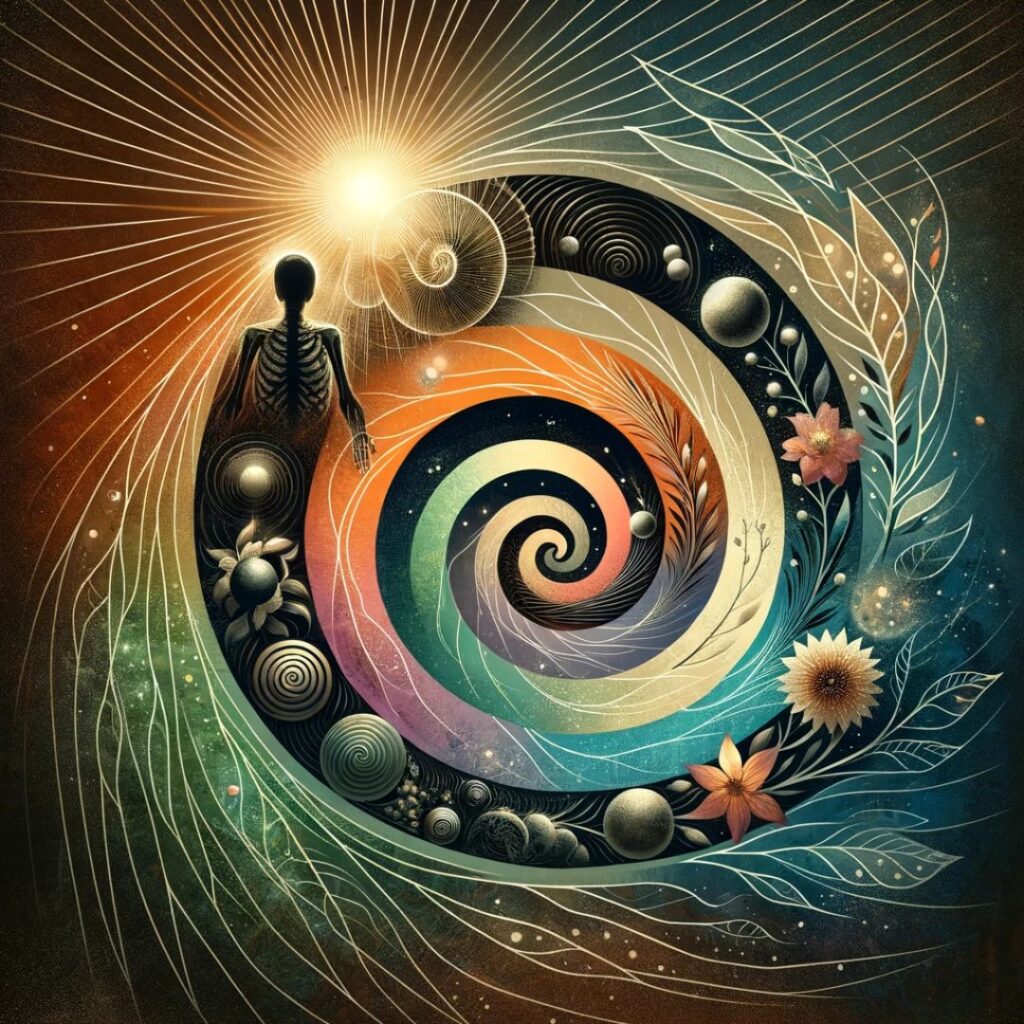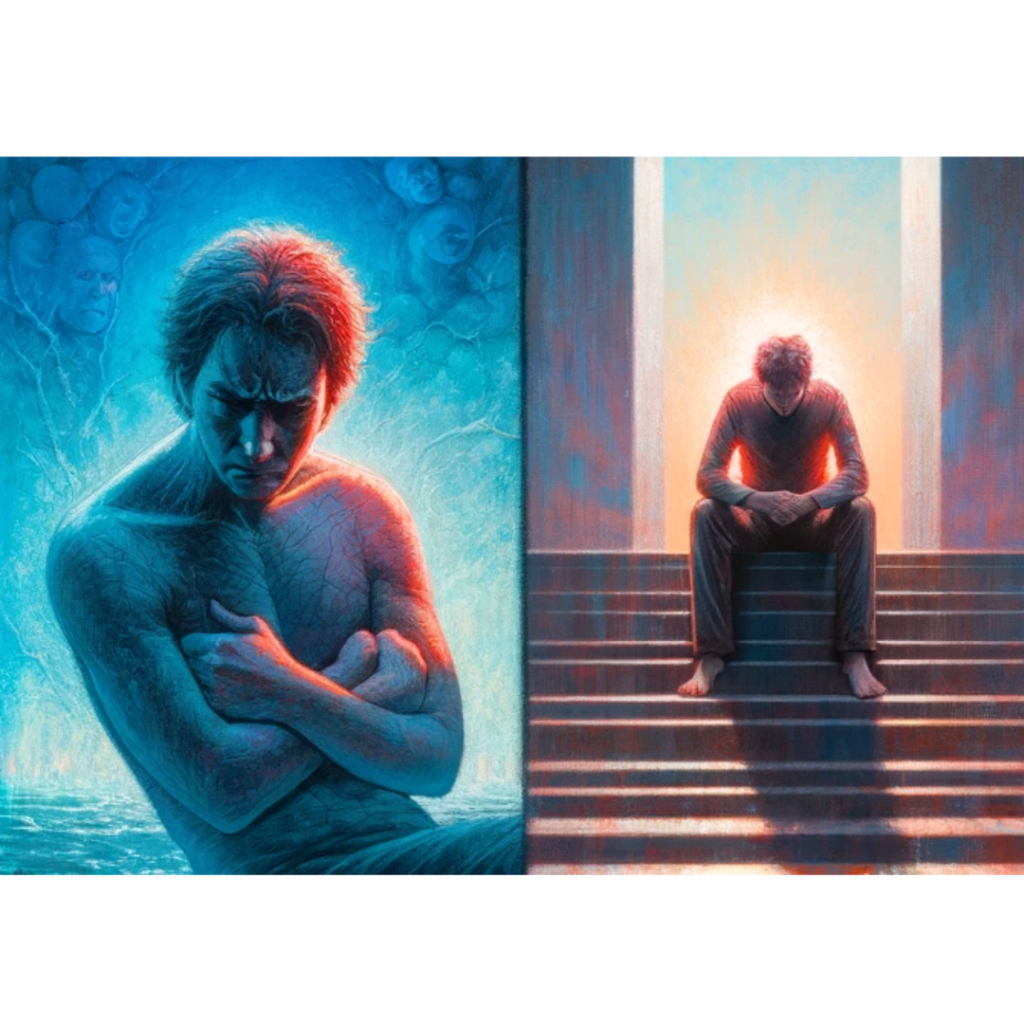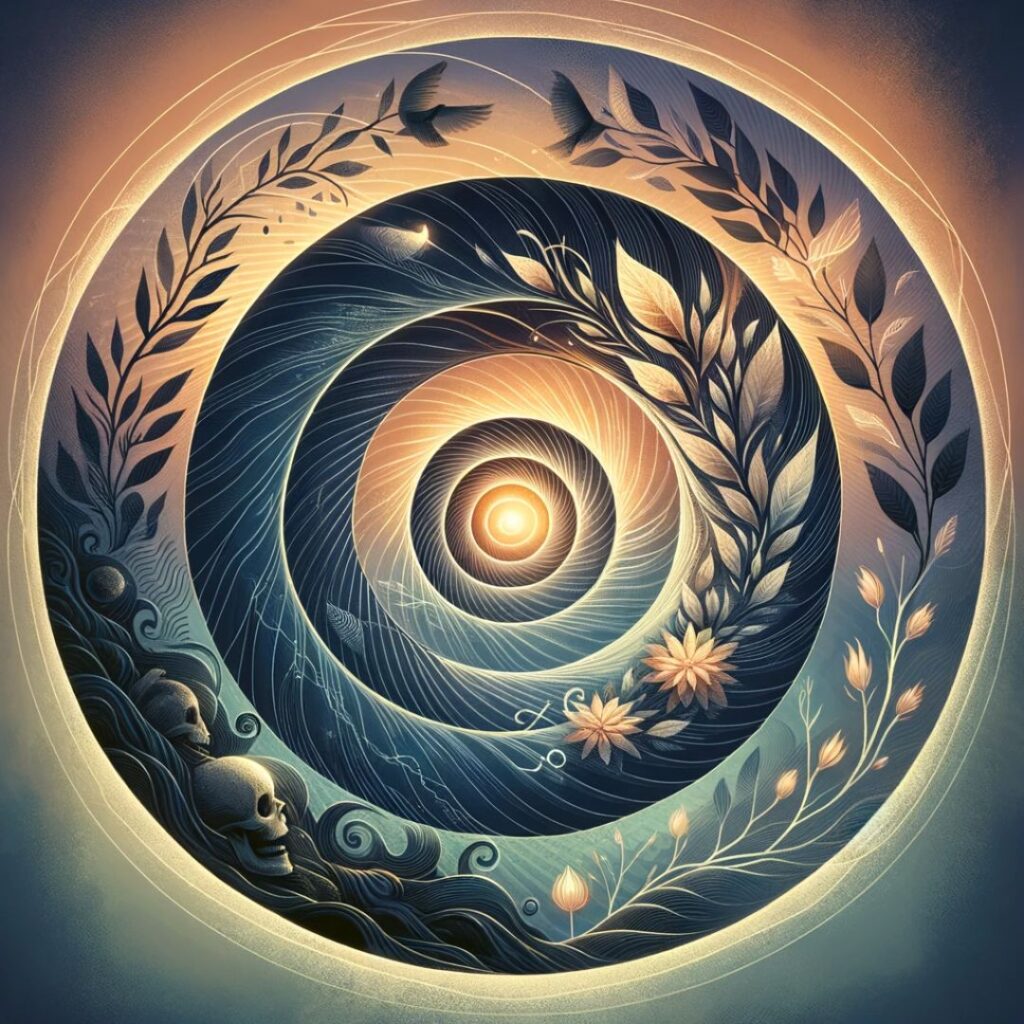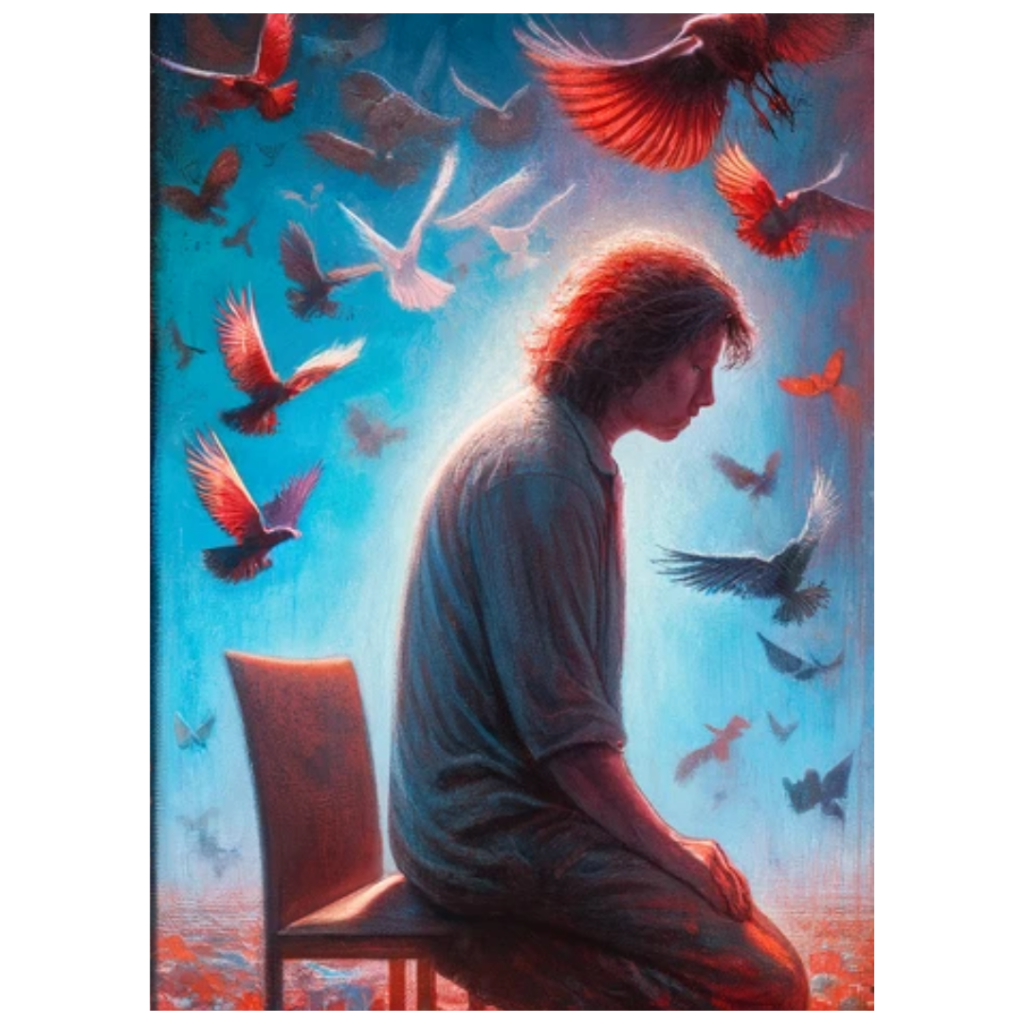Grief is an intricate and deeply personal journey that we embark upon when we experience a significant loss. In my work as a professional medium, I’ve had the privilege of guiding individuals through the labyrinth of emotions that constitute the grief journey. In this article, we will explore the stages of grief, the varying timelines of this process, and how understanding and compassion can be our guides along this challenging path.

A beautiful metaphor that explains the nature of grief and the cycles we cross in our soul’s expansion and growth. Grief is a spiral- A vortex of self-growth and discovery. Imagine grief as a spiral, a continuous, ever-turning path that we navigate in our unique way. This personal journey is one we each have to take on our own. It is during this spiral of life lessons that our souls learn and expand to our highest human potential.
At the center of this spiral lies the heart of our loss, and as we journey outward, we encounter the varying emotions that make up the labyrinth of grief. The stages of denial, anger, bargaining, depression, and acceptance become the twists and turns of this intricate spiral.
Just like a spiral, we may find ourselves revisiting certain emotions, circling back around to them as we seek understanding and healing. The bigger the spiral becomes the less intense each lesson can feel. However these lessons are never gone, we learn to adapt and grow as the spiral continues to spread.

It’s a journey that defies a linear map, and every step is a movement toward a deeper comprehension of ourselves and our capacity to endure. Understanding the spiral of grief is to recognize that, like the twists in a labyrinth, our emotions are interconnected and interwoven, leading us toward acceptance and hope.
There are emotions that we will experience during this spiral of grief. As we become aware of the stages of grief, we can better understand how to make the most of these seemingly painful life lessons. The grief journey is often described in terms of stages, as first introduced by psychiatrist Elisabeth Kübler-Ross. These stages are not necessarily experienced linearly, and individuals may move back and forth between them.
The initial stage is often characterized by disbelief and shock. It’s the mind’s way of protecting us from the overwhelming reality of the loss.
During this phase, individuals may struggle to accept what has happened. For those living with major denial, it is easy for the body, mind, and soul to feel numb.
A lack of desire, connection, and the inability to make decisions can be a factor in the denial stage.
As the reality of the loss sets in, anger can surface. It’s a natural response to feeling powerless and can be directed at oneself, God, others, or even the universe.
Anger is one of the most potent emotions we experience in this human world. I believe anger shows up swinging as a way to release all the emotions that may have been numbed out in the denial phase. Feeling angry isn’t necessarily a bad thing.
Anger can be a HUGE catalyst for growth. Intense emotions tend to bring intense awakening and new found awareness. Do not make yourself bad and wrong for feeling angry.

In this stage, individuals may try to make deals or promises in an attempt to change the outcome. In deep phases of grief and loss, we tend to feel like we don’t have a grip or control in life.
The thing is, no matter how hard we try, how much we try to control… everything in life is unknown.
As much as we like this we are in control, At any moment life can be changed. One minute everything is okay, the next minute the comfort you have spent so long creating can be swept away in the blink of an eye.
This can feel good or bad. But in the end, there is always a lesson to learn, a miracle to experience, and a new future unfolding. It’s a way of seeking control in a situation where control has been lost.
Feelings of sadness, hopelessness, and despair are common during this stage. It isn’t uncommon to feel a huge part of you missing. Finding ways to connect to your deceased loved ones can help you climb out the dark hole of depression.
Our loved one who have passed are still engaged in our life. They are here supporting is in the details of our life. If we allow them, they will show us the support.
Ultimately, many individuals reach a stage of acceptance. This doesn’t necessarily mean they are “over” the loss, but rather that they have come to terms with it and are finding a way to move forward with their lives.
What you are experiencing, regardless of the circumstance, is a part of your soul longed for experience. You are not your experiences. You are not emotions.
You are not your current life situation. Yes, you are here experiencing this right now… but it doesn’t define who you truly are.

You may hear, “time heals everything”, I don’t think missing someone goes away. The awful grief & pain may cease however the memories and feelings don’t. While there are waves we will go through when it comes to grief, there are many fun light hearted ways we can connect with those who have passed.
It’s important to understand that grief is not a neat and orderly process. There is no prescribed timeline, and no two individuals will experience it in exactly the same way.
Some may move through the stages relatively quickly, while others may linger in one stage for an extended period. Your grief journey is uniquely yours, and that is entirely okay.
Just as the spiral continues to expand, so does your soul. There will always be seasons of remembrance and mourning. There will also be seasons of celebration and happiness. When those waves of grief come rushing in, know that they are but a small moment in your soul’s infinite book of life. You are powerful. You are strong. You are being supported throughout this journey. You are never alone.

During the grief journey, it’s crucial to surround yourself with understanding and compassionate individuals who can support you without judgment. Whether it’s friends, family, support groups, or professionals, seeking support is not a sign of weakness but rather a step towards healing.
Growth is messy and at times looks completely different than you might expect. That is how it is meant to be. Give yourself as much grace and compassion, you would give to others.
As a medium, I’ve witnessed the transformative power of connecting with loved ones who have passed. This can be a source of comfort and solace for those grieving, offering the reassurance that their loved ones are still with them in some form.
It is my passion to assist those navigating the spiral of grief. There is nothing more rewarding than bringing hope and shining a light when others feel surrounded by darkness. At times we all need support recharging our lights as we make our way through the spiral of life.

In conclusion, Navigating Grief After Death, the grief journey is a deeply personal experience that encompasses a range of emotions and stages. Grief is a spiral, a labyrinth of emotions. It is not a linear process, and there is no right or wrong way to grieve. Understanding and compassion, both for yourself and from those around you, are invaluable companions on this path. The spiral of grief is a profound and continuous journey through the depths of our emotions. Like an ever-turning spiral, we move through the stages of denial, anger, bargaining, depression, and acceptance, often revisiting them as we seek understanding and healing.
As we continue our journey outward, we discover that hope is the focal point, the guiding light that becomes more luminous with each turn.
It reminds us that while grief may twist and turn, it also offers the potential for growth, resilience, and a renewed sense of purpose. With hope as our compass, we navigate the spiral of grief, knowing that it leads us towards a brighter tomorrow.
In future articles, we will delve into coping strategies and finding hope after a loved one has passed. Remember that you are not alone on your grief journey, and there is always the potential for healing and growth.